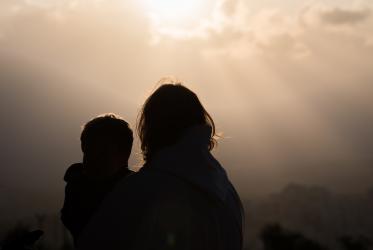Tribute to the victims of Fukushima nuclear accident from the World Council of Churches general secretary
A year ago we were all confronted with the chain of tragic events unleashed by the Fukushima Daiichi nuclear disaster which followed the Tohoku earthquake and tsunami of 11 March 2011.
We still don't have a clear picture of all the consequences of this disaster, but we know that significant amounts of radioactive material have been released into the atmosphere, the ground and ocean waters.
Some people died because of the direct radiation exposures or related consequences. The estimation of future cancer deaths due to accumulated radiation exposures in the population living near Fukushima range from 100 to 1000. Furthermore, more than 100,000 people have been forced to leave areas with high levels of radiation, which has meant losing their homes, communities and livelihoods. And many still live in contaminated areas, including pregnant women and children who are more vulnerable to the effects of radiation exposure.
The accident showed clearly that, despite all safety provisions, there is no way to guarantee there will be no nuclear accident. Unfortunately, the nuclear industry and its regulators have continued to minimize the dangers and have been unable or unwilling to provide proper protection and support to the people who have been impacted. Interestingly, countries having taken steps to phase out nuclear power, for different reasons, have not suffered an energy crisis. Both Japan, which is presently running only three of its fifty-eight nuclear reactors, and Germany, which permanently has closed half its nuclear power plants, have managed to function normally with energy savings and better usage of other energy sources.
As we move towards the UN Conference on Sustainable Development (Rio+20) in a year when the UN calls nations and peoples to help achieve sustainable energy for all, remembering the Fukushima disaster and paying tribute to its victims should encourage governments to take clear steps towards achieving sustainable communities.
As Christians, we believe God called us to life in its all fullness (John 10:10). The Fukushima nuclear accident threatened all forms of life within the disaster zone and this threat continues with nuclear reactors running and spent nuclear fuel which will remain radioactive and dangerous for millennia. Shortly after Fukushima, 1,000 representatives from churches in every region of the world, gathered in Jamaica for the World Council of Churches International Ecumenical Peace Convocation. Participants in this convocation said: "The aftermath of earthquake and tsunami in Japan raises urgent questions concerning nuclear energy and threats to nature and humanity... The nuclear catastrophe of Fukushima has proved once again that we must no longer rely on nuclear power as a source of energy".
As we express solidarity with the victims of the nuclear accident in Fukushima, we would also like to honour the many people who have come to their assistance including humanitarian relief, counselling and radiation monitoring supported by Japanese member churches of the WCC. Let us all respond as individuals, communities and nations with concrete steps to protect peoples and the earth from more such tragedies in future.
Rev. Dr Olav Fykse Tveit
General secretary
World Council of Churches



